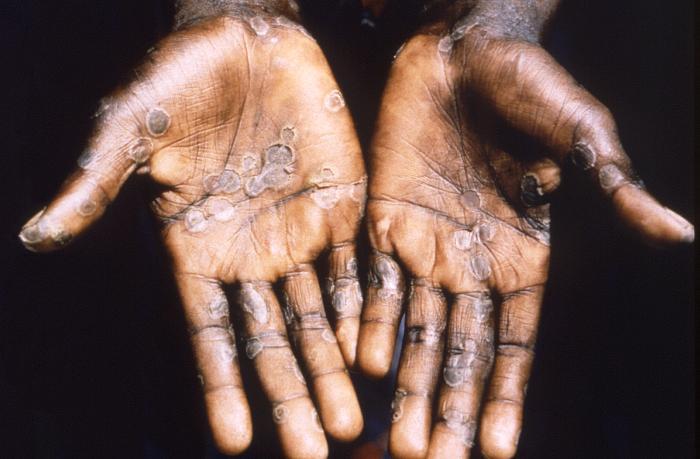Through November 12, 2023, the ongoing clade 1 mpox outbreak in the Democratic Republic of the Congo (DRC) sickened nearly 13,000 people—the most ever recorded in a year—and killed nearly 600, according to a rapid communication published yesterday in Eurosurveillance.
Today the country's health ministry and the DRC office of the World Health Organization updated those numbers, noting that, for the full year, 14,626 suspected cases were reported, with 654 deaths, for a case-fatality rate (CFR) of 4.5%. On yesterday's US Centers for Disease Control and Prevention (CDC) and Infectious Diseases Society of America clinician call, Agam Rao, MD, of the CDC's US Public Health Service, said that 3,576 suspected mpox cases and 265 deaths have been reported in the DRC through the first 9 weeks of 2024, for an estimated CFR of 7.4%.
The reports come as the neighboring Republic of Congo reports its first mpox cases.
To characterize the causative mpox strain in the DRC and determine whether commonly used tests can detect those strains, an international research team sequenced mpox viral genomes from 10 hospitalized patients in the Kamituga health zone in South Kivu, DRC. The patients, 5 men and 5 women, were in their late teens to mid-20s, and most were sex workers.
Last week, scientists reported that heterosexual transmission is helping fuel the DRC outbreak.
Mpox test 'likely not reliable' for new substrain
As of November 12, 12,569 suspected cases of the primarily sexually transmitted infection had been reported, with an estimated case-fatality rate of 4.6% and cases diagnosed in DRC regions without a history of mpox, such as South Kivu and Kinshasa.
Of the 10 study patients, nearly complete mpox genomic sequences were available for 6. All were categorized as clade 1 but were a distinct substrain from all other clade 1 sequences, which the authors said suggests that the South Kivu outbreak resulted from a separate viral introduction, probably of animal origin. The six sequences had several mutations, pointing to ongoing circulation over some time.
Our findings ... suggest that there are at least two independent outbreaks ongoing in DRC.
A check to determine whether commonly used mpox polymerase chain reaction (PCR) tests could detect the mutated sequences showed that while the generic primers and probe maintained their function, the specific clade 1 PCR target gene was absent. "Due to the deletion, the rapid US CDC [Centers for Disease Control and Prevention] method to identify Clade I in newly diagnosed mpox cases is most likely not reliable for detection of the novel sub-lineage identified in the current study," the researchers wrote.
The 2023 international mpox outbreak, which was spread primarily via sexual contact among men who have sex with men, was caused by a clade 2b virus.
"Although sequences from a small 2023 Kinshasa outbreak are not publicly available, the placement of those sequences in a published phylogenetic tree suggests that the Kamituga outbreak is not related to the outbreak in Kinshasa," the authors wrote. "Our findings therefore suggest that there are at least two independent outbreaks ongoing in DRC."
Republic of Congo confirms 43 cases
Yesterday, the Associated Press reported that the Republic of Congo's health ministry published an internal report this week on the detection of 43 mpox cases in 9 of 12 of the country's departments.
The government did not comment on the report, which was not officially distributed to the media and appears to have been intended for internal use, the AP story said. Scientists have warned that sexual transmission of mpox in Africa, reported for the first time late last year, could make the disease difficult to contain.
The Republic of Congo and the DRC share a border more than 1,000 miles long.




















